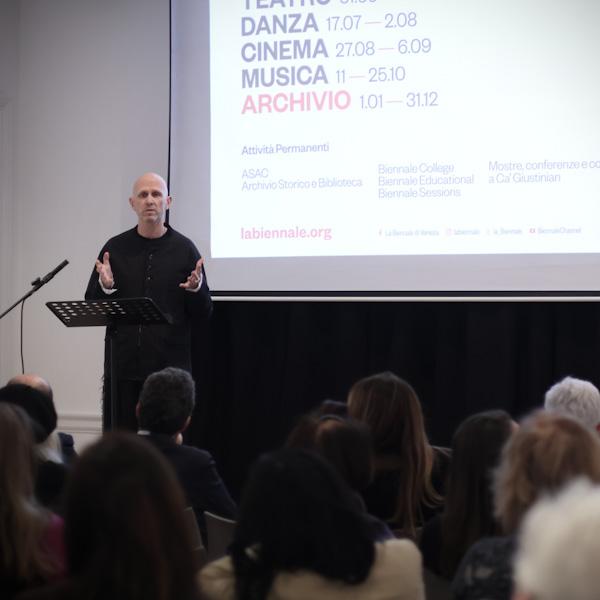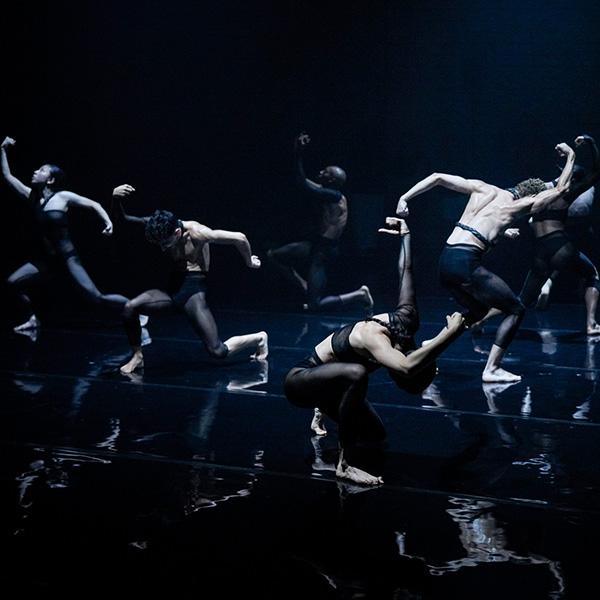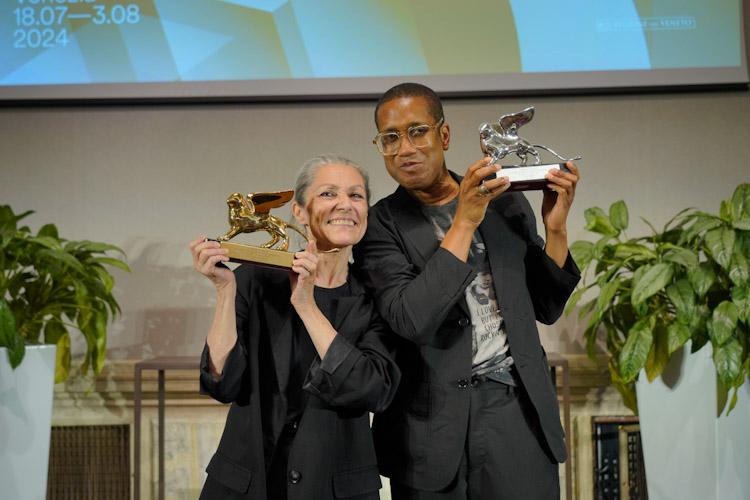
The 2024 Lion awards for Dance
The Golden Lion for Lifetime Achievement goes to Italian dancer and choreographer Cristina Caprioli. The American dancer and choreographer Trajal Harrell will receive the Silver Lion.
The awards
The Italian dancer and choreographer based in Sweden Cristina Caprioli, author of a body of works that disrupt the linguistic and perceptive conventions of dance and have consolidated her international role, is the Golden Lion for Lifetime Achievement of Biennale Danza 2024.
Trajal Harrell, one of the most original and sought-after dancers and choreographers in recent years who advances an “expanded” dance which metabolises Vogue dance, postmodern, butoh, research and pop culture, has been awarded the Silver Lion of Biennale Danza 2024.
The Lions were awarded by the Board of Directors of La Biennale di Venezia upon recommendation of the director of the Dance department Wayne McGregor. The awards ceremony will be held on July 21st in Sala delle Colonne in Ca’ Giustinian, headquarters of La Biennale, during the 18th International Festival of Contemporary Dance (18 July > 3 August).
Cristina Caprioli
Golden Lion for Lifetime Achievement
The dancer, choreographer, experimental theoretician, academic and curator Cristina Caprioli advances an idea of choreography as “a critical discourse in continuous motion”, in which the creative act is never severed from reflection and is, on the contrary, thinking that raises questions about making dance at the very moment in which dance is generated. A leading figure in Scandinavian dance, the international reach of Cristina Caprioli’s thought and work, writes Wayne McGregor in his motivation, “has quietly and substantially influenced multiple generations of choreographers during her three decades of provocative physical research”. He continues: “In the mid-1990s, Caprioli founded the independent organisation ccap, wherein she has produced a wide variety of performances, installations, films, objects, publications and other ‘choreographies’, alongside focussed long-term interdisciplinary research projects. Caprioli’s choreography is characterised by precision, complexity and emergent forms of physical virtuosity. All of her productions challenge the field’s normative formats and exchange economies and the philosophical underpinnings of her canon have balanced rigorous conceptual research with engaging and highly accessible embodied experiences. Caprioli’s commitment to the advancement, evolution and development of our art form has been an industry inspiration and her under the radar approach to all that she undertakes belies the exceptional quality and integrity of her 360-degree creative process”.
Cristina Caprioli came to Biennale Danza with her ccap company in 2010, when she presented the world premiere of cut-outs & trees, a show produced by La Biennale di Venezia with Dance Umbrella in London and Dansens Hus in Stockholm.
This year at the 18th Festival, Cristina Caprioli will present some of her latest work and a new creation: Deadlock and Flat Haze respectively at the Teatro alle Tese and the Sale d’Armi at the Arsenale, which will be on display for the entire duration of the Festival (18 July > 3 August); Silver at Forte Marghera, which may be seen on weekends; The Bench, which Cristina Caprioli herself, exceptionally in the role of mentor, will create for and with the dancers and choreographers selected for Biennale College.
Trajal Harrell
Silver Lion
“Trajal Harrell is a true original”, writes Wayne McGregor in presenting the recipient of the Silver Lion, whom he had already invited to Biennale Danza two years ago with Maggie the Cat, a work inspired by Tennessee Williams’ play to question power, gender, intolerance, inclusion.
“A graduate of Yale University, Centre National de la Danse (Yvonne Rainer) and Martha Graham School of Contemporary Dance, his foundational research is based on a rich conversation between post-modern dance, the New York voguing scene and Japanese dance Butoh. His work reimagines our pasts and laughs at chronological, geographical and cultural distance, leading to performances in venues dedicated as much to visual arts as to live theatre. Harrell uses the tools of critical thought, in particular research about gender, feminism and post-colonialism, to mine his own deep knowledge of art and dance history. The result of extensive research, his shows are like so many sensitive, hybrid and joyful objects that borrow equally from fashion, pop culture, and avant-garde artists. It is in this unique mix of genres, the surprising juxtaposition of forms and uniquely vast emotional range that Harrell’s work engages and enthrals. We laugh as quickly as we cry in a visceral and sensorial rollercoaster of poignancy and joy”.
Trajal Harrell returns to Biennale Danza for the 18th Festival with two works: Tambourines and Sister or He Buried the Body.
The awardees of the previous editions
In the past the Golden Lion for Lifetime Achievement for Dance has been awarded to Merce Cunningham (1995), Carolyn Carlson (2006), Pina Bausch (2007), Jirí Kylián (2008), William Forsythe (2010), Sylvie Guillem (2012), Steve Paxton (2014), Anne Teresa De Keersmaeker (2015); Maguy Marin (2016); Lucinda Childs (2017); Meg Stuart (2018), Alessandro Sciarroni (2019), La Ribot (2020), Germaine Acogny (2021), Sabuto Teshigawara (2022), Simone Forti (2023).
The Silver Lion, dedicated to the cutting-edge figures in dance in recent years, or to the institutions that have distinguished themselves for cultivating new talents, has been awarded in the past to Anne Teresa De Keersmaeker's Performing Arts Research and Training Studios (2010), to Michele Di Stefano (2014), to Dana Michel (2017), Marlene Monteiro Freitas (2018), Steven Michel and Théo Mercier (2019), Claudia Castellucci (2020), Oona Doherty (2021), Rocío Molina (2022), Tao Dance Theater (2023).
Biographical notes
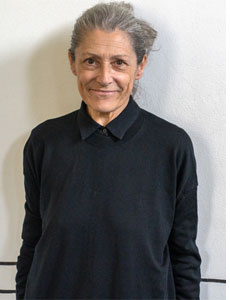 Cristina Caprioli (Brescia – Italia, 1953) is an Italian dancer and choreographer based in Stockholm. All her works express a critical urgency of thought and action through the precision of line and the complexity of structure. After her art-oriented high-school studies in Brescia, from 1971 to 1974 she attended the Stockholm Ballet Academy. From 1975 to 1977, she moved to New York, where she continued her training at the Merce Cunningham Studio, at the School of American Ballet and with Viola Farber. and worked with Douglas Dunn. Between 1979 and 1981 she returned to New York, where she was inspired by the work of Jennifer Muller, Larry Rhodes, Maggie Black and Zena Romett. It was during this time that she also attended classes with Twyla Tharp. After a career as a dancer in Switzerland, Germany and New York, in 1983 she moved definitively to Stockholm. Here, in 1998, she founded the independent company ccap, with which she produces performances, choreographies, installations, films, objects, publications, and is responsible for long-term interdisciplinary research projects.
Cristina Caprioli (Brescia – Italia, 1953) is an Italian dancer and choreographer based in Stockholm. All her works express a critical urgency of thought and action through the precision of line and the complexity of structure. After her art-oriented high-school studies in Brescia, from 1971 to 1974 she attended the Stockholm Ballet Academy. From 1975 to 1977, she moved to New York, where she continued her training at the Merce Cunningham Studio, at the School of American Ballet and with Viola Farber. and worked with Douglas Dunn. Between 1979 and 1981 she returned to New York, where she was inspired by the work of Jennifer Muller, Larry Rhodes, Maggie Black and Zena Romett. It was during this time that she also attended classes with Twyla Tharp. After a career as a dancer in Switzerland, Germany and New York, in 1983 she moved definitively to Stockholm. Here, in 1998, she founded the independent company ccap, with which she produces performances, choreographies, installations, films, objects, publications, and is responsible for long-term interdisciplinary research projects.
In 2001 she presented Body, interrupted at the Tate Modern in London; in 2008 Cicada at Jacobs Pillow (USA) with the soloists of the Stockholm Opera ballet. In 2013 she presented trees at PS1 MoMA in New York and in 2015 at Fabbrica Europa in Florence. In 2022, she presented Once Over Time, a retrospective of her work over the past 20 years, commissioned by Tanz im August (Berlin), and also presented in Stockholm and Umeå.
In 1997 she promoted the festival/symposium Talking Dancing, in 2000 the festival/workshop Movement is a Woman, in 2012 the research/symposium Weaving Politics (Stockholm). In 2014 she held the lecture Choreo-Drift in Berlin, and later in Copenhagen, Stockholm, Tensta, New York and Philadelphia. Active as a theoretician and teacher as well, from 2008 to 2013 she was Professor of choreography at the Stockholm University of the Arts. In 2014, she also taught at Harvard University in Boston; in 2022 she was the Mercator visiting professor at the Freie Universität in Berlin, and in 2024 she will be teaching at Yale University (New Haven). Caprioli’s teaching and theoretical work has been presented at: Impulstanz in Vienna, SEAD in Salzburg, Schwere Reiter in Munich, Skolen for Modern Dance in Copenhagen, Fabbrica Europa and Parc in Florence, Ricerca X Torino.
Her awards and acknowledgments include: Cullberg Prize (2008), Gannevik Stipendium (2013), Royal Gold Medal Illis quorum meruere labores (2021), the highest Swedish acknowledgment “for her significant contribution as a dancer and choreographer and for her exceptional contribution in the field of Swedish and international dance”.
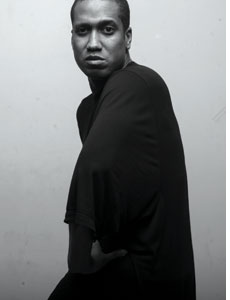 Trajal Harrell (Douglas, GA – USA, 1973) is an American dancer and choreographer. Known above all for the series of choreographic interventions titled Twenty Looks or Paris is Burning at the Judson Church, Trajal Harrell is now considered one of the most important choreographers of his generation. After graduating from Yale University, he continued his studies at the Centre national de la danse and at the Martha Graham School of Contemporary Dance. His works, which arise from the cross-fertilisation between different choreographic languages rooted in gender, feminist and post-colonial studies, reimagine the past beyond chronological, geographic and cultural distances, paying particular attention to the aesthetics of the costumes, often inspired by high fashion. His works have been presented in many venues, including: Stedelijk Museum in Amsterdam (2014), Centre Pompidou (2015), Palais de Tokyo (2016), Festival d’Avignon (2016); MoMA (2016); Tanz im August (2017); Hammer Museum in Los Angeles (2017); Barbican (2017); The Kitchen in New York (2018), Festival d’Automne (2019), Gwangiu Biennale (2021), Bienal de Sao Paulo (2021), Schauspiehaus in Zurich (2019-2022), Kunstenfestivaldesarts in Brussels (2022), Holland Festival (2022).
Trajal Harrell (Douglas, GA – USA, 1973) is an American dancer and choreographer. Known above all for the series of choreographic interventions titled Twenty Looks or Paris is Burning at the Judson Church, Trajal Harrell is now considered one of the most important choreographers of his generation. After graduating from Yale University, he continued his studies at the Centre national de la danse and at the Martha Graham School of Contemporary Dance. His works, which arise from the cross-fertilisation between different choreographic languages rooted in gender, feminist and post-colonial studies, reimagine the past beyond chronological, geographic and cultural distances, paying particular attention to the aesthetics of the costumes, often inspired by high fashion. His works have been presented in many venues, including: Stedelijk Museum in Amsterdam (2014), Centre Pompidou (2015), Palais de Tokyo (2016), Festival d’Avignon (2016); MoMA (2016); Tanz im August (2017); Hammer Museum in Los Angeles (2017); Barbican (2017); The Kitchen in New York (2018), Festival d’Automne (2019), Gwangiu Biennale (2021), Bienal de Sao Paulo (2021), Schauspiehaus in Zurich (2019-2022), Kunstenfestivaldesarts in Brussels (2022), Holland Festival (2022).
His works include: Used Abused and Hung Out to Dry (2013), The Ghost of Montpellier Meets the Samurai (2015), The Return of La Argentina, In the Mood for Frankie (2016), Caen Amour (2016), Juliet and Romeo. In 2017 he presented the performative exhibition Hoochie Koochie at the Barbican Centre Art Gallery (London).
He was named “Dancer of the Year” by Tanz magazine in 2018; he has also won the Doris Duke Impact Award and a Bessie Award.

